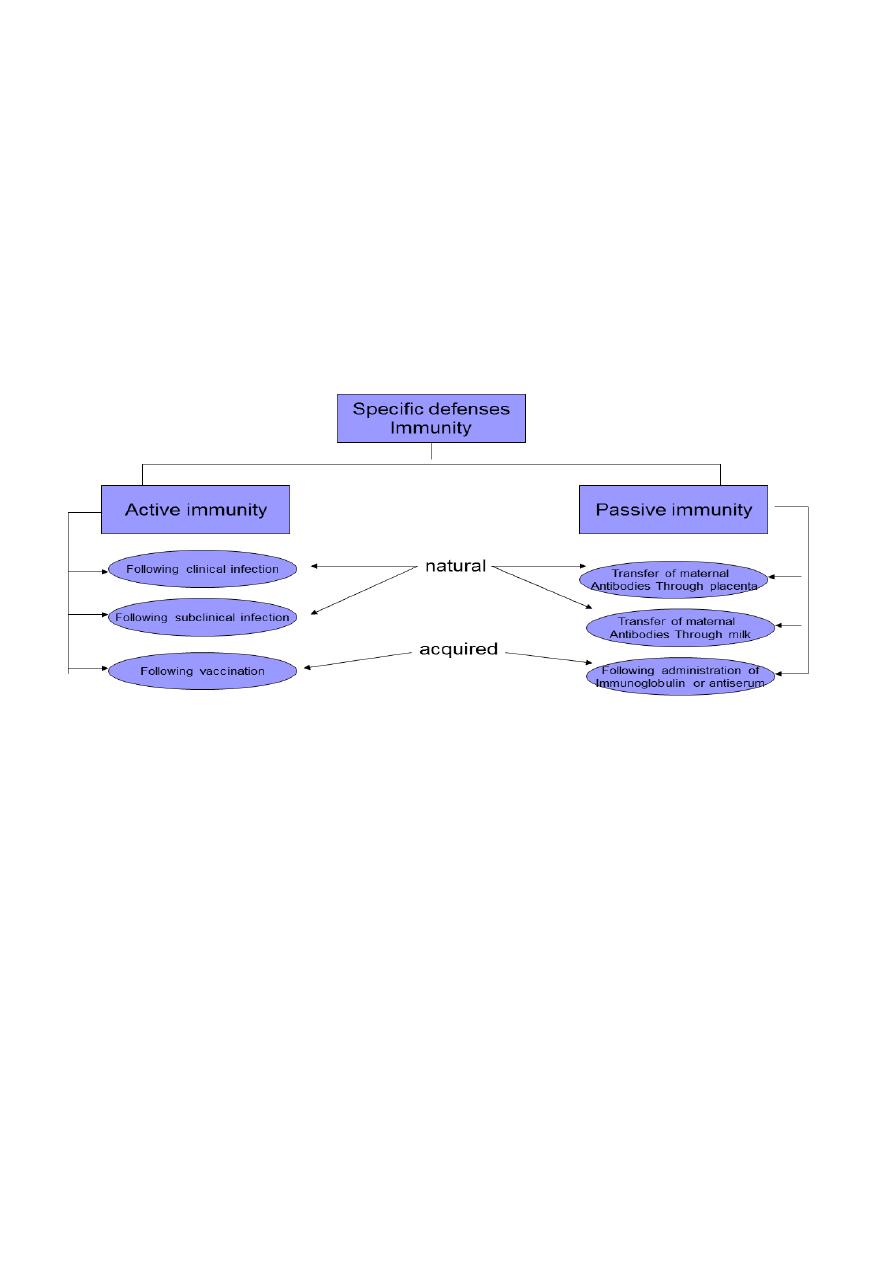
Pediatrics Lec 6 Dr. Nawal
1
Fatima Ehsan Awchi
Immunization
IMMUNITY
B cell( humeral)
Tcell (cellular)
complement
Disease prevention measures
Immunization is the process of inducing immunity against a specific disease.
1-
PASSIVE IMMUNITY
: Passive immunity is achieved by
1- administration of preformed antibodies to induce transient protection
against an infectious agent.
2- Passive immunity also can be induced naturally through transplacental
transfer of antibodies during gestation. Maternally derived antibodies can
provide protection during an infant's first months of life. Protection for some
diseases may persist for as long as a year after birth
The major indications for passive immunity are to provide protection to (1)
immunodeficient children with B-lymphocyte defects who have difficulties in
making antibodies; (2) persons exposed to infectious diseases or who are at
imminent risk of exposure where there is not adequate time for them to
develop an active immune response to a vaccine; and (3) persons with an
infectious disease as part of specific therapy for that diseas
Rabies, tetanus, hepatitis

Pediatrics Lec 6 Dr. Nawal
2
Fatima Ehsan Awchi
2- ACTIVE IMMUNIZATION.
Vaccines are defined as whole or parts of microorganisms administered to
prevent an infectious disease. Vaccines can consist
1- whole inactivated microorganisms (polio and hepatitis A),
2-
parts of the organism (acellular pertussis, human papillomavirus [HPV], and HepB)
3- polysaccharide capsules (pneumococcal and meningococcal polysaccharide
vaccines),
4-polysaccharide capsules conjugated to protein carriers (Hib, pneumococcal,
and meningococcal conjugate vaccines),
5- live attenuated microorganisms (BCG, measles, mumps, rubella, varicella,
rotavirus, and live attenuated influenza vaccines), and
6- toxoids (tetanus and diphtheria) . A toxoid is a modified bacterial toxin that is
made nontoxic but is still able to induce an active immune response against the
toxin.
VACCINE
AGE
BENEFICIARY
BCG* and OPV,HBV
Birth
Infants
DPT&OPV, HBV, Hib, rota, pcv
2 mon
DPT&OPV,Hib, Rota. PCV
4mon
DPT&OPV, HBV, Hib, Rota,PCV
6 mon
Measles vaccine
9 months
MMR
15 mon
DPT&OPV(Booster dose), PCV
18 months
DT vaccine
5 years
Children
Tetanus toxoid
10years
Tetanus toxoid
16years

Pediatrics Lec 6 Dr. Nawal
3
Fatima Ehsan Awchi
PRECAUTIONS AND CONTRAINDICATIONS.
A contraindication means the vaccine should not be administered under any
circumstances. A generic contraindication for all vaccines is anaphylaxis to a
prior dose. Anaphylactic hypersensitivity to vaccine constituents is also a
contraindication. However, if a vaccine is essential, there are desensitizing
protocols for some vaccines.
Live attenuated vaccines generally are contraindicated in immunocompromised
persons. The exceptions include MMR, which may be given to a child with HIV
infection provided the child is asymptomatic or symptomatic without evidence
of severe immunosuppression,
Preterm--- same except HBV
Steroid: Moderate – sever illness until recovery
VACCINE REACTIONS:
1- Common/ minor reactions. Local reactions (pain , swelling , redness), fever
and systemic symptoms – result as a part of immune response. Other reactions
– result as a part of the components in the vaccine (viz. Aluminum adjuvant,
stabilizers or preservatives ).
2- RARE VACCINE REACTIONS These are rare & more serious reactions caused by
vaccine administration (like anaphylaxis, encephalopathy , febrile seizures ,
thrombocytopenia etc.,) These serious reactions in general do not lead to long
term problems.
RARE VACCINE REACTIONS:
BCG Suppurative lymphadenitis,Osteitis,Disseminated infection.
Hep-B Anaphylaxis
Measles/MMR Febrile seizures , thrombocytopenia, anaphylaxis,
encephalopathy
OPV Vaccine associated paralytic poliomyelitis
Tetanus Brachial neuritis,Anaphylaxis
Pertussis Persistent inconsolable screaming(>3hrs) , seizures , anaphylaxis ,
encephalopathy

Pediatrics Lec 6 Dr. Nawal
4
Fatima Ehsan Awchi
REACTIONS DUE TO HYPERSENSITIVITY:
REACTIONS DUE TO HYPERSENSITIVITY Many viral vaccines contain traces of
antibiotics to which some individuals are sensitive. ANAPHYLAXIS: is a severe
reaction of rapid onset , characterized by circulatory collapse. It affects SKIN
(erythema , urticaria , angioedema) RESPIRATORYSYSTEM (dry cough , cyanosis ,
respiratory distress) GIT (abdominal cramps) CVS (tachycardia , hypotension)
CNS (loss of consciousness)
BCG VACCINE for percutaneous use, is an attenuated, live culture preparation of
the Bacillus of Calmette and Guerin (BCG) strain of Mycobacterium bovis.
Not protect primary infection but prevent disseminated TB
Sabin's polio vaccine Oral live-attenuated vaccine
Contains 3 serotypes of vaccine virus
Shed in stool for up to 6 weeks.
Paralysis rare
Local & systemic protection
MMR vaccine:
highly effective vaccine, SC in two doses
rubella portion to protect against congenital rubella
side effects 5-12 days following immunization.
Fever and rash .
Transient arthritis.
Thrombocytopenia (rare)
Encephalopathy (very rare)
